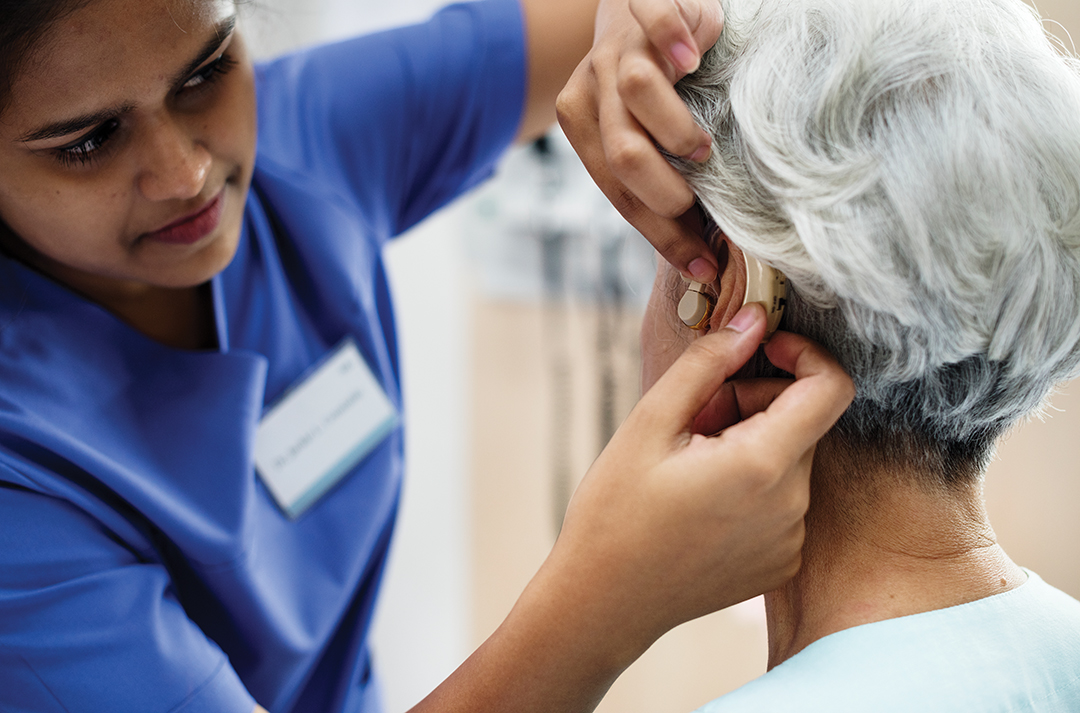
iStock.com/Rawpixel
Advice for spotting hearing loss—and how treatment can help—from a Minnetonka audiologist.
October is National Hearing Month, so it’s a perfect time of year to talk with an expert about hearing loss—and the very real consequences of failing to treat it. Not only can hearing loss cause problems with mental health and socialization, but those factors can further lead to memory problems and dementia. Luckily, there are incredibly effective tools to help bridge the gap between our ears and our brains: hearing aids.
Amanda Bohn, audiologist at Associated Hearing Care in Minnetonka, says hearing aids can be an important tool against cognitive decline. “With untreated hearing loss, we are not keeping our brains as active and keeping those neural pathways stimulated,” Bohn says. “Humans rely on human interaction, and when you can’t hear, you aren’t getting all of the info. You might get cognitive overload. You reduce your social interactions, which can lead to anxiety and depression.”
Bohn, who joined Associated Hearing Care in 2020, is passionate about helping people of all ages hear better. “We’re really building our practice in Minnetonka,” she says of the clinic, which was founded in St. Paul 48 years ago and has expanded, under new owners, to several locations around the Metro.
Though there’s a perception that “older” folks are the main demographic for hearing aids, Bohn says she’s increasingly seeing patients as young as 40—many of whom noticed their diminished hearing for the first time during the COVID-19 pandemic. “People started noticing it was harder for them to understand conversations without lip reading, while wearing masks or while working over the phone or computer,” Bohn says. Leaps in technology that have made hearing aids smaller, less noticeable and less expensive are also persuading more people to try them.
Even people with seemingly great hearing should start testing regularly around age 40. (Most insurance plans cover tests as preventive care.) “It’s good to get a baseline, just in case something happens later,” Bohn says, adding hearing tests should be as routine (and destigmatized) as eye exams or teeth cleanings. “We never force hearing aids on someone,” she says. “We might recommend it if there’s a loss, but hearing aids alone might not be a fix all.”
So what are some signs you (or a loved one) might need a hearing test? “When someone’s speaking, and you’re doing a lot of, ‘What?’ or ‘Huh?’” Bohn says. “You might be asking people to repeat themselves or having trouble hearing in crowds or background noise.” Tinnitus (ringing or buzzing in the ear) is another red flag.
Hearing loss affects not just social interactions and cognitive health, but also emotional health. It can lead to mood swings and irritability, and researchers have even found links to diabetes and high blood pressure. People who start wearing hearing aids almost always notice an immediate improvement in their quality of life, according to Bohn, who says, “Their interactions improve, and their word retrieval and comprehension improve.”
For those who are reluctant to get tested, asking a friend or family member to also get tested could ease apprehension.
Associated Hearing Care
15450 Highway 7, Minnetonka; 952.232.5499
Facebook: Associated Hearing Care






















